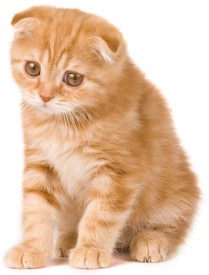
This disease is not nearly as dangerous as FVR or Calicivirus, but it does cause a disturbing upper respiratory infection, especially in cats that are housed together with a lot of other cats. Pneumonitis is not caused by a virus but by a chlamydial organism (something between a bacterium and a virus). It's transmitted through respiratory tract secretions - sneezing, for example.
Signs Of Feline Pneumonitis
Signs of pneumonitis are usually limited to sneezing and a mild watering of the eyes. The veterinarian diagnoses peneumonitis by observing the clinical signs. A cat with a mild respiratory infection that has no fever and continues to eat is usually assumed to have pneumonitis.
Signs of pneumonitis are usually limited to sneezing and a mild watering of the eyes. The veterinarian diagnoses peneumonitis by observing the clinical signs. A cat with a mild respiratory infection that has no fever and continues to eat is usually assumed to have pneumonitis.
Treatment Of Feline Pneumonitis
Because this is not a viral condition, antibiotics are often useful in treating pneumonitis. Supportive therapy may include eye drops to treat eye infection, antibiotics to try to destroy the organism and control secondary bacterial invaders, forced feeding if necessary, and, occasionally, intravenous fluid therapy if signs of dehydration are present.
Because this is not a viral condition, antibiotics are often useful in treating pneumonitis. Supportive therapy may include eye drops to treat eye infection, antibiotics to try to destroy the organism and control secondary bacterial invaders, forced feeding if necessary, and, occasionally, intravenous fluid therapy if signs of dehydration are present.
Feline Pneumonitis Prevention
Routine vaccination against pneumonitis is not generally necessary for house cats. However, if you've got a number of cats, if your cat goes outside, or if you exhibit your cat in breed shows, you should discuss the advisability of vaccination with your veterinarian. The cat is vaccinated at eight to ten weeks, again at 14 to 16 weeks, and will need annual boosters.
Routine vaccination against pneumonitis is not generally necessary for house cats. However, if you've got a number of cats, if your cat goes outside, or if you exhibit your cat in breed shows, you should discuss the advisability of vaccination with your veterinarian. The cat is vaccinated at eight to ten weeks, again at 14 to 16 weeks, and will need annual boosters.
Feline Pneumonitis:

Pet Meds: Dogs | Pet Meds: Cats | Dog Health : By Breed | Cat Health : By Breed | Dog Grooming | Cat Grooming | Pet Top 10's | Pet Food Recipes
Pet Meds: Dogs Pet Meds: Cats Common Dog Health Issues Common Cat Health Issues Dog Grooming Cat Grooming Pet Top 10's
Pet Health:Home
Copyright 2006-2011 PetMedsOnline.Org

Online Store For Cats!
Find everything from basic grooming items and tasty treats, to high tech devices designed for pets!
Find everything from basic grooming items and tasty treats, to high tech devices designed for pets!
Pet Top Lists!
From the friendliest cat breeds to the most intelligent dogs, you'll find it all on our "pet top list" pages!
From the friendliest cat breeds to the most intelligent dogs, you'll find it all on our "pet top list" pages!

